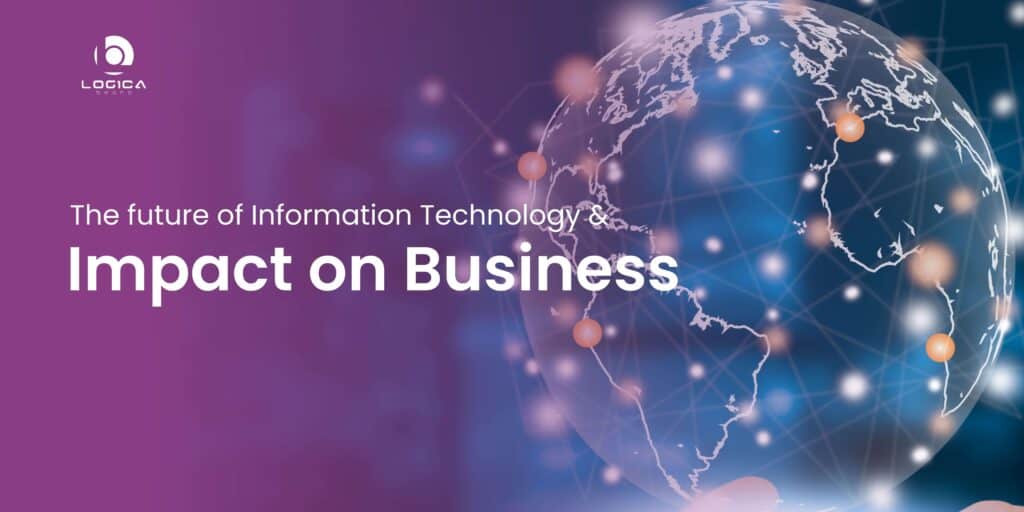Are you curious about the future of information technology and how it will impact businesses around the world?
It’s no wonder that the world of business is developing and adjusting to these changes as technology continues to evolve at a rapid rate. Emerging technologies, ranging from artificial intelligence to cloud computing, are changing the way organizations operate, communicate, and provide value to their consumers.
Information technology has been a game changer for business across industries, enabling them to streamline operations, improve efficiency, and better serve customers. But, in the recent years, the rate of technological progress has accelerated dramatically, with new technologies developing at an unpredicted rate. This is causing a substantial shift in the way firms’ functions, connect with consumers, and compete in the market.
In this blog, we will take a deeper look about the future of information technology and its impact on business as well as the challenges and opportunity that lie ahead of it. So, let’s dive in and take a closer look what the future holds for IT and business.
Overview of information technology
Have you ever wondered how you may send an email, communicate with pals on social media, or watch your favorite TV and movies online? It’s all owing to information technology (IT), our modern world’s digital backbone.
IT is fundamentally concerned with the management, processing, and communication of information. It consists of a diverse set of technologies that collaborate to make this feasible. Computers, networks, the internet, databases, software, and mobile devices are just a few of the instruments in the IT world.
One of the most exciting aspects about the future of information technology is that technology is always growing, giving new possibilities and opportunities. Technology has altered the way we live and work, from the introduction of the internet to the emergence of smartphones, and it shows no signs of slowing down.
The world is evolving quickly, perhaps even faster than predicted and so is the technology. Artificial intelligence, robotics, virtual reality, and quantum computing, among other fields have witnessed tremendous advancements in recent years. These changes have created new possibilities and difficulties in a variety of industries, including healthcare, banking, transportation, and education.
Going back in time, the Harvard Business Review defined information technology in 1958 as “the techniques for the rapid processing of information, the use of statistical and mathematical models for decision-making, and the simulation of higher-order thinking through computer programs,” but today it encompasses much more.
IT is a field that handles and processes information for large-scale organizations or businesses. The term “information technology” today refers to all forms of digital communications and technologies. Information technology encompasses everything, from reading emails to operating software on computers to conducting a Zoom call with coworkers. Even analyzing consumer data and live streaming social media are important aspects of information technology.
Nearly every area of today’s world incorporates information technology, from the economy to industry to our daily lives. We can instantly convey information to the next cubicle or across the world. Gadgets link us to our health, homes, and families more than ever before. Of course, information technology isn’t only for business. It’s also about how we communicate and consume information and entertainment. We can interact with friends and family from all over the world thanks to the internet and social media, and we can watch our favorite shows and movies whenever and wherever we want thanks to streaming services.
The digital engine that propels our modern world is information technology. Technology is always changing and introducing new possibilities and chances, revolutionizing how we live and work. Technology is a crucial aspect of our lives, whether you’re a company owner, a student, or just someone who enjoys technology.
Advancement in information technology
Technology is rapidly changing. Artificial intelligence, geotargeting, automation, and other information technology developments notably lay the basis for further technological growth. Robots are growing more intelligent, and our thermostats and refrigerators may now be linked to the internet.
Below are some examples of information technology advancement.
● Chatbots
Chatbots are one of the many technological innovations that are changing the way businesses communicate with their consumers. These automated messaging platforms employ artificial intelligence (AI) to imitate human-like conversations, allowing businesses to give quick assistance and services 24/7.
Chatbots are growing rapidly in a range of areas, including e-commerce healthcare, finance, and customer support. They can answer basic questions, promote products, give technical assistance, and even execute orders and payments. One of the most significant benefits of chatbots is their capacity to give quick and efficient assistance. They can handle several questions at the same time without requiring human assistance. This will not save only time but also lessens the workload of customer support representative, allowing them to concentrate on more complicated issues.
● Virtual and augmented reality
Virtual Reality (VR) and Augmented Reality (AR) are technologies that allow people to interact and immerse themselves in digital surroundings. Virtual reality (VR) includes total immersion in a digital environment, whereas augmented reality (AR) involves the overlay of digital information over the actual world. These technologies are being used in a variety of industries, including gaming, entertainment, education, and training.
VR and AR can give consumers with a more immersive and engaging experience in gaming and entertainment. VR and AR in education may give students with immersive and interesting learning experiences, allowing them to study different subjects in a more participatory and memorable way. VR and AR may be used in training to imitate real-world settings and surroundings, giving learners with a safe and controlled environment to practice and develop their abilities.
● Blockchain technology
Blockchain technology is a decentralized ledger that securely and transparently record transaction. It enables the development of tamper-proof and permanent documents removing the need for middlemen and lowering the danger of fraud. Although this technology is commonly connected with cryptocurrencies, its uses go beyond the financial industry.
Supply chain management, identity verification, and voting systems are some of the possible uses of blockchain technology. Blockchain may be used in supply chain management to monitor things from their origin to their final destination, enabling transparency and accountability. Blockchain may be used in identity verification to securely and decentralized store personal information. Blockchain may be used in voting systems to protect the integrity of the voting process, enabling transparency and eliminating fraud.
● Internet of things (IoT)
The Internet of Things (IoT) is the internet-based connectivity of numerous gadgets, appliances, and sensors that allows them to interact and share data. This technology allows a new degree of automation by delivering real-time data and insights to help with decision making. IoT allows equipment to be remotely operated and information to be accessible at any time and from any location.
Smart homes, wearable gadgets, and smart cities are just a few examples of IoT applications. IoT may be used to manage lighting, heating, and security systems in a smart house. Smartwatches and other wearable gadgets may track a person’s health and fitness statistics. IoT may be utilized in smart cities to control traffic, cut energy usage, and improve public safety.
● Cloud Computing
The distribution of computer services such as storage, servers, databases, software, and analytics through the internet is referred to as cloud computing. It does away with the necessity for on-premise hardware and software by enabling on-demand access to computing resources from anywhere in the globe. This technology has become a must-have for enterprises of all kinds, delivering scalable, cost-effective, and secure infrastructure.
Cloud computing provides enhanced efficiency, scalability, and accessibility. It helps firms to swiftly react to shifting market needs while saving time and money on traditional IT infrastructure. Cloud computing also improves corporate security since data is kept in off-site data centers that use modern security procedures.
The impacts of information technology in business
Information technology has had a tremendous influence on how organizations run, from how employees and consumers communicate and cooperate to how firms manage their operations and make strategic choices.
Some of the most significant effects of information technology in business include:
● Improved Efficiency
With the advancement of information technology, organizations can now automate regular procedures, lowering the time and expenses associated with conventional manual processes. Accounting software, for example, has simplified financial administration, while customer relationship management software has improved customer communication and service.
● Better Communication
Information technology has transformed company communication, allowing employees to interact and communicate with one another from anywhere in the globe. Email, instant messaging, video conferencing, and other technologies have simplified corporate communication with clients and partners.
● Improved Decision-Making
As a result of advances in information technology, organizations now have access to massive volumes of data and analytics, allowing them to make better and more informed decisions. Real-time insights into consumer behavior, market trends, and operational performance may be provided through business intelligence and data analytics tools, helping firms to make better strategic decisions.
● Increased Productivity
Productivity has increased because information technology has made it possible for organizations to be more productive by providing tools and software that can automate regular processes, minimize mistakes, and simplify workflows. Increased efficiency may lead to improved customer service, higher-quality products, and more profitability.
● Better Customer Experience
Advances in information technology have made it simpler for businesses to understand and respond to the requirements and preferences of their customers, resulting in a better overall customer experience. Businesses may now communicate with clients in real time through online self-service portals, social media, and mobile applications, delivering rapid and easy service.
Information technology has had a significant impact on business, allowing companies to function more efficiently, communicate more effectively, and make better decisions. As technology advances, it will be interesting to watch how businesses use it to improve their operations and better serve their consumers.
What is the actual future of information technology?
As we look into the future of information technology, we can’t help but be amazed and excited by the tremendous discoveries that are yet to come. The world around us is rapidly changing, and technology is driving this change.
In the upcoming years, we will see a world in which information technology is more intertwined with every aspect of our existence. With a single device, we’ll be able to control your house, car, and complete surroundings. Our smart home will respond to voice commands, altering lighting, temperature, and entertainment according to our preferences.
The internet will be quicker, more dependable, and safer than ever. Massive quantities of data can be downloaded and uploaded in seconds, making streaming movies and games a breeze. With new developments in artificial intelligence, we’ll be able to easily search, analyze, and handle massive volumes of data.
Yet, the future of information technology will have an influence on more than just our personal lives. The environment around us will change as well. Self-driving automobiles and delivery drones will navigate city streets, while virtual and augmented reality will become prevalent in fields such as healthcare and education.
It’s difficult not to be astonished by the possibilities as we look forward to the future of information technology. The potential of technology is virtually infinite, from enhancing our daily lives to altering whole sectors. So, buckle up and prepare for an exciting journey, for the future has arrived, and it’s only going to get better from here.
Conclusion
It becomes obvious that a technological revolution is about to occur when you consider the direction of information technology and how it will affect business. The possibilities are boundless, and the developments of recent years are only the beginning. Yet, if anything is certain, it’s that information technology has a promising future. Whether you are a tiny startup or the business professional in the industry of information technology, it’s time to start considering how you might use technology to advance your company. The opportunity to benefit from the present is already here.










